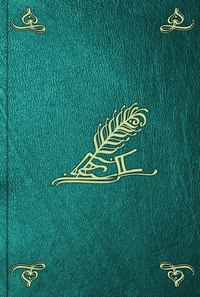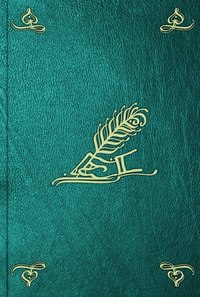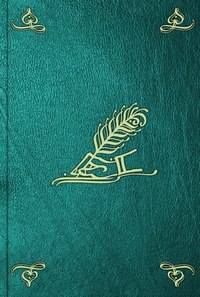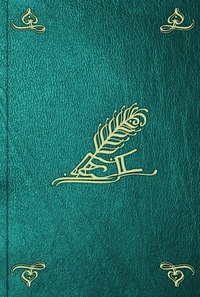 полная версия
полная версияLife and Letters of Charles Darwin — Volume 2
CH. DARWIN.
CHARLES DARWIN TO ASA GRAY. Down, June 3 [1874].
... I am now hard at work getting my book on Drosera & Co. ready for the printers, but it will take some time, for I am always finding out new points to observe. I think you will be interested by my observations on the digestive process in Drosera; the secretion contains an acid of the acetic series, and some ferment closely analogous to, but not identical with, pepsin; for I have been making a long series of comparative trials. No human being will believe what I shall publish about the smallness of the doses of phosphate of ammonia which act.
... I began reading the Madagascar squib (A description of a carnivorous plant supposed to subsist on human beings.) quite gravely, and when I found it stated that Felis and Bos inhabited Madagascar, I thought it was a false story, and did not perceive it was a hoax till I came to the woman...
CHARLES DARWIN TO F.C. DONDERS. (Professor Donders, the well-known physiologist of Utrecht.) Down, July 7, 1874.
My dear Professor Donders,
My son George writes to me that he has seen you, and that you have been very kind to him, for which I return to you my cordial thanks. He tells me on your authority, of a fact which interests me in the highest degree, and which I much wish to be allowed to quote. It relates to the action of one millionth of a grain of atropine on the eye. Now will you be so kind, whenever you can find a little leisure, to tell me whether you yourself have observed this fact, or believe it on good authority. I also wish to know what proportion by weight the atropine bore to the water solution, and how much of the solution was applied to the eye. The reason why I am so anxious on this head is that it gives some support to certain facts repeatedly observed by me with respect to the action of phosphate of ammonia on Drosera. The 1/4000000 of a grain absorbed by a gland clearly makes the tentacle which bears this gland become inflected; and I am fully convinced that 1/20000000 of a grain of the crystallised salt (i.e. containing about one-third of its weight of water of crystallisation) does the same. Now I am quite unhappy at the thought of having to publish such a statement. It will be of great value to me to be able to give any analogous facts in support. The case of Drosera is all the more interesting as the absorption of the salt or any other stimulant applied to the gland causes it to transmit a motor influence to the base of the tentacle which bears the gland.
Pray forgive me for troubling you, and do not trouble yourself to answer this until your health is fully re-established.
Pray believe me, Yours very sincerely, CHARLES DARWIN.
[During the summer of 1874 he was at work on the genus Utricularia, and he wrote (July 16th) to Sir J.D. Hooker giving some account of the progress of his work: —
"I am rather glad you have not been able to send Utricularia, for the common species has driven F. and me almost mad. The structure is MOST complex. The bladders catch a multitude of Entomostraca, and larvae of insects. The mechanism for capture is excellent. But there is much that we cannot understand. From what I have seen to-day, I strongly suspect that it is necrophagous, i.e. that it cannot digest, but absorbs decaying matter."
He was indebted to Lady Dorothy Nevill for specimens of the curious Utricularia montana, which is not aquatic like the European species, but grows among the moss and debris on the branches of trees. To this species the following letter refers:]
CHARLES DARWIN TO LADY DOROTHY NEVILL. Down September 18 [1874].
Dear Lady Dorothy Nevill,
I am so much obliged to you. I was so convinced that the bladders were with the leaves that I never thought of removing the moss, and this was very stupid of me. The great solid bladder-like swellings almost on the surface are wonderful objects, but are not the true bladders. These I found on the roots near the surface, and down to a depth of two inches in the sand. They are as transparent as glass, from 1/20 to 1/100 of an inch in size, and hollow. They have all the important points of structure of the bladders of the floating English species, and I felt confident I should find captured prey. And so I have to my delight in two bladders, with clear proof that they had absorbed food from the decaying mass. For Utricularia is a carrion-feeder, and not strictly carnivorous like Drosera.
The great solid bladder-like bodies, I believe, are reservoirs of water like a camel's stomach. As soon as I have made a few more observations, I mean to be so cruel as to give your plant no water, and observe whether the great bladders shrink and contain air instead of water; I shall then also wash all earth from all roots, and see whether there are true bladders for capturing subterranean insects down to the very bottom of the pot. Now shall you think me very greedy, if I say that supposing the species is not very precious, and you have several, will you give me one more plant, and if so, please to send it to "Orpington Station, S.E.R., to be forwarded by foot messenger."
I have hardly ever enjoyed a day more in my life than I have this day's work; and this I owe to your Ladyship's great kindness.
The seeds are very curious monsters; I fancy of some plant allied to Medicago, but I will show them to Dr. Hooker.
Your ladyship's very gratefully, CH. DARWIN.
CHARLES DARWIN TO J.D. HOOKER. Down, September 30, 1874.
My dear H.,
Your magnificent present of Aldrovanda has arrived quite safe. I have enjoyed greatly a good look at the shut leaves, one of which I cut open. It is an aquatic Dionaea, which has acquired some structures identical with those of Utricularia!
If the leaves open and I can transfer them open under the microscope, I will try some experiments, for mortal man cannot resist the temptation. If I cannot transfer, I will do nothing, for otherwise it would require hundreds of leaves.
You are a good man to give me such pleasure.
Yours affectionately, C. DARWIN.
[The manuscript of 'Insectivorous Plants' was finished in March 1875. He seems to have been more than usually oppressed by the writing of this book, thus he wrote to Sir J.D. Hooker in February: —
"You ask about my book, and all that I can say is that I am ready to commit suicide; I thought it was decently written, but find so much wants rewriting, that it will not be ready to go to printers for two months, and will then make a confoundedly big book. Murray will say that it is no use publishing in the middle of summer, so I do not know what will be the upshot; but I begin to think that every one who publishes a book is a fool."
The book was published on July 2nd, 1875, and 2700 copies were sold out of the edition of 3000.]
CHAPTER 2.XIV. — THE 'POWER OF MOVEMENT IN PLANTS.'
1880[The few sentences in the autobiographical chapter give with sufficient clearness the connection between the 'Power of Movement,' and one of the author's earlier books, that on 'Climbing Plants.' The central idea of the book is that the movements of plants in relation to light, gravitation, etc., are modifications of a spontaneous tendency to revolve or circumnutate, which is widely inherent in the growing parts of plants. This conception has not been generally adopted, and has not taken a place among the canons of orthodox physiology. The book has been treated by Professor Sachs with a few words of professorial contempt; and by Professor Wiesner it has been honoured by careful and generously expressed criticism.
Mr. Thiselton Dyer ('Charles Darwin' ('Nature' Series), page 41.) has well said: "Whether this masterly conception of the unity of what has hitherto seemed a chaos of unrelated phenomena will be sustained, time alone will show. But no one can doubt the importance of what Mr. Darwin has done, in showing that for the future the phenomena of plant movement can and indeed must be studied from a single point of view."
The work was begun in the summer of 1877, after the publication of 'Different Forms of Flowers,' and by the autumn his enthusiasm for the subject was thoroughly established, and he wrote to Mr. Dyer: "I am all on fire at the work." At this time he was studying the movements of cotyledons, in which the sleep of plants is to be observed in its simplest form; in the following spring he was trying to discover what useful purpose these sleep-movements could serve, and wrote to Sir Joseph Hooker (March 25th, 1878): —
"I think we have PROVED that the sleep of plants is to lessen the injury to the leaves from radiation. This has interested me much, and has cost us great labour, as it has been a problem since the time of Linnaeus. But we have killed or badly injured a multitude of plants: N.B. — Oxalis carnosa was most valuable, but last night was killed."
His letters of this period do not give any connected account of the progress of the work. The two following are given as being characteristic of the author:]
CHARLES DARWIN TO W. THISELTON DYER. Down, June 2, 1878.
My dear Dyer,
I remember saying that I should die a disgraced man if I did not observe a seedling Cactus and Cycas, and you have saved me from this horrible fate, as they move splendidly and normally. But I have two questions to ask: the Cycas observed was a huge seed in a broad and very shallow pot with cocoa-nut fibre as I suppose. It was named only Cycas. Was it Cycas pectinata? I suppose that I cannot be wrong in believing that what first appears above ground is a true leaf, for I can see no stem or axis. Lastly, you may remember that I said that we could not raise Opuntia nigricans; now I must confess to a piece of stupidity; one did come up, but my gardener and self stared at it, and concluded that it could not be a seedling Opuntia, but now that I have seen one of O. basilaris, I am sure it was; I observed it only casually, and saw movements, which makes me wish to observe carefully another. If you have any fruit, will Mr. Lynch (Mr. R.I. Lynch, now Curator of the Botanic Garden at Cambridge was at this time in the Royal Gardens, Kew.) be so kind as to send one more?
I am working away like a slave at radicles [roots] and at movements of true leaves, for I have pretty well done with cotyledons...
That was an EXCELLENT letter about the Gardens (This refers to an attempt to induce the Government to open the Royal Gardens at Kew in the morning.): I had hoped that the agitation was over. Politicians are a poor truckling lot, for [they] must see the wretched effects of keeping the gardens open all day long.
Your ever troublesome friend, CH. DARWIN.
CHARLES DARWIN TO W. THISELTON DYER. 4 Bryanston St., Portman Square, November 21 [1878].
My dear Dyer,
I must thank you for all the wonderful trouble which you have taken about the seeds of Impatiens, and on scores of other occasions. It in truth makes me feel ashamed of myself, and I cannot help thinking: "Oh Lord, when he sees our book he will cry out, is this all for which I have helped so much!" In seriousness, I hope that we have made out some points, but I fear that we have done very little for the labour which we have expended on our work. We are here for a week for a little rest, which I needed.
If I remember right, November 30th, is the anniversary at the Royal, and I fear Sir Joseph must be almost at the last gasp. I shall be glad when he is no longer President.
Yours very sincerely, CH. DARWIN.
[In the spring of the following year, 1879. When he was engaged in putting his results together, he wrote somewhat despondingly to Mr. Dyer: "I am overwhelmed with my notes, and almost too old to undertake the job which I have in hand — i.e. movements of all kinds. Yet it is worse to be idle."
Later on in the year, when the work was approaching completion, he wrote to Prof. Carus (July 17, 1879), with respect to a translation: —
"Together with my son Francis, I am preparing a rather large volume on the general movements of Plants, and I think that we have made out a good many new points and views.
"I fear that our views will meet a good deal of opposition in Germany; but we have been working very hard for some years at the subject.
"I shall be MUCH pleased if you think the book worth translating, and proof-sheets shall be sent you, whenever they are ready."
In the autumn he was hard at work on the manuscript, and wrote to Dr. Gray (October 24, 1879): —
"I have written a rather big book — more is the pity — on the movements of plants, and I am now just beginning to go over the MS. for the second time, which is a horrid bore."
Only the concluding part of the next letter refers to the 'Power of Movements':]
CHARLES DARWIN TO A. DE CANDOLLE. May 28, 1880.
My dear Sir,
I am particularly obliged to you for having so kindly send me your 'Phytographie' (A book on the methods of botanical research, more especially of systematic work.); for if I had merely seen it advertised, I should not have supposed that it could have concerned me. As it is, I have read with very great interest about a quarter, but will not delay longer thanking you. All that you say seems to me very clear and convincing, and as in all your writings I find a large number of philosophical remarks new to me, and no doubt shall find many more. They have recalled many a puzzle through which I passed when monographing the Cirripedia; and your book in those days would have been quite invaluable to me. It has pleased me to find that I have always followed your plan of making notes on separate pieces of paper; I keep several scores of large portfolios, arranged on very thin shelves about two inches apart, fastened to the walls of my study, and each shelf has its proper name or title; and I can thus put at once every memorandum into its proper place. Your book will, I am sure, be very useful to many young students, and I shall beg my son Francis (who intends to devote himself to the physiology of plants) to read it carefully.
As for myself I am taking a fortnight's rest, after sending a pile of MS. to the printers, and it was a piece of good fortune that your book arrived as I was getting into my carriage, for I wanted something to read whilst away from home. My MS. relates to the movements of plants, and I think that I have succeeded in showing that all the more important great classes of movements are due to the modification of a kind of movement common to all parts of all plants from their earliest youth.
Pray give my kind remembrances to your son, and with my highest respect and best thanks,
Believe me, my dear Sir, yours very sincerely, CHARLES DARWIN.
P.S. — It always pleases me to exalt plants in the organic scale, and if you will take the trouble to read my last chapter when my book (which will be sadly too big) is published and sent to you, I hope and think that you also will admire some of the beautiful adaptations by which seedling plants are enabled to perform their proper functions.
[The book was published on November 6, 1880, and 1500 copies were disposed of at Mr. Murray's sale. With regard to it he wrote to Sir J.D. Hooker (November 23): —
"Your note has pleased me much — for I did not expect that you would have had time to read ANY of it. Read the last chapter, and you will know the whole result, but without the evidence. The case, however, of radicles bending after exposure for an hour to geotropism, with their tips (or brains) cut off is, I think, worth your reading (bottom of page 525); it astounded me. The next most remarkable fact, as it appeared to me (page 148), is the discrimination of the tip of the radicle between a slightly harder and softer object affixed on opposite sides of tip. But I will bother you no more about my book. The sensitiveness of seedlings to light is marvellous."
To another friend, Mr. Thiselton Dyer, he wrote (November 28, 1880): —
"Very many thanks for your most kind note, but you think too highly of our work, not but what this is very pleasant... Many of the Germans are very contemptuous about making out the use of organs; but they may sneer the souls out of their bodies, and I for one shall think it the most interesting part of Natural History. Indeed you are greatly mistaken if you doubt for one moment on the very great value of your constant and most kind assistance to us."
The book was widely reviewed, and excited much interest among the general public. The following letter refers to a leading article in the "Times", November 20, 1880:]
CHARLES DARWIN TO MRS. HALIBURTON. (Mrs. Haliburton was a daughter of my father's early friend, the late Mr. Owen, of Woodhouse.) Down, November 22, 1880.
My dear Sarah,
You see how audaciously I begin; but I have always loved and shall ever love this name. Your letter has done more than please me, for its kindness has touched my heart. I often think of old days and of the delight of my visits to Woodhouse, and of the deep debt of gratitude I owe to your father. It was very good of you to write. I had quite forgotten my old ambition about the Shrewsbury newspaper (Mrs. Haliburton had reminded him of his saying as a boy that if Eddowes' newspaper ever alluded to him as "our deserving fellow-townsman," his ambition would be amply gratified.); but I remember the pride which I felt when I saw in a book about beetles the impressive words "captured by C. Darwin." Captured sounded so grand compared with caught. This seemed to me glory enough for any man! I do not know in the least what made the "Times" glorify me (The following is the opening sentence of the leading article: — "Of all our living men of science none have laboured longer and to more splendid purpose than Mr. Darwin."), for it has sometimes pitched into me ferociously.
I should very much like to see you again, but you would find a visit here very dull, for we feel very old and have no amusement, and lead a solitary life. But we intend in a few weeks to spend a few days in London, and then if you have anything else to do in London, you would perhaps come and lunch with us. (My father had the pleasure of seeing Mrs. Haliburton at his brother's house in Queen Anne Street.)
Believe me, my dear Sarah, Yours gratefully and affectionately, CHARLES DARWIN.
[The following letter was called forth by the publication of a volume devoted to the criticism of the 'Power of Movement in Plants' by an accomplished botanist, Dr. Julius Wiesner, Professor of Botany in the University of Vienna:]
CHARLES DARWIN TO JULIUS WIESNER. Down, October 25th, 1881.
My dear Sir,
I have now finished your book ('Das Bewegungsvermogen der Pflanzen.' Vienna, 1881.), and have understood the whole except a very few passages. In the first place, let me thank you cordially for the manner in which you have everywhere treated me. You have shown how a man may differ from another in the most decided manner, and yet express his difference with the most perfect courtesy. Not a few English and German naturalists might learn a useful lesson from your example; for the coarse language often used by scientific men towards each other does no good, and only degrades science.
I have been profoundly interested by your book, and some of your experiments are so beautiful, that I actually felt pleasure while being vivisected. It would take up too much space to discuss all the important topics in your book. I fear that you have quite upset the interpretation which I have given of the effects of cutting off the tips of horizontally extended roots, and of those laterally exposed to moisture; but I cannot persuade myself that the horizontal position of lateral branches and roots is due simply to their lessened power of growth. Nor when I think of my experiments with the cotyledons of Phalaris, can I give up the belief of the transmission of some stimulus due to light from the upper to the lower part. At page 60 you have misunderstood my meaning, when you say that I believe that the effects from light are transmitted to a part which is not itself heliotropic. I never considered whether or not the short part beneath the ground was heliotropic; but I believe that with young seedlings the part which bends NEAR, but ABOVE the ground is heliotropic, and I believe so from this part bending only moderately when the light is oblique, and bending rectangularly when the light is horizontal. Nevertheless the bending of this lower part, as I conclude from my experiments with opaque caps, is influenced by the action of light on the upper part. My opinion, however, on the above and many other points, signifies very little, for I have no doubt that your book will convince most botanists that I am wrong in all the points on which we differ.
Independently of the question of transmission, my mind is so full of facts leading me to believe that light, gravity, etc., act not in a direct manner on growth, but as stimuli, that I am quite unable to modify my judgment on this head. I could not understand the passage at page 78, until I consulted my son George, who is a mathematician. He supposes that your objection is founded on the diffused light from the lamp illuminating both sides of the object, and not being reduced, with increasing distance in the same ratio as the direct light; but he doubts whether this NECESSARY correction will account for the very little difference in the heliotropic curvature of the plants in the successive pots.
With respect to the sensitiveness of the tips of roots to contact, I cannot admit your view until it is proved that I am in error about bits of card attached by liquid gum causing movement; whereas no movement was caused if the card remained separated from the tip by a layer of the liquid gum. The fact also of thicker and thinner bits of card attached on opposite sides of the same root by shellac, causing movement in one direction, has to be explained. You often speak of the tip having been injured; but externally there was no sign of injury: and when the tip was plainly injured, the extreme part became curved TOWARDS the injured side. I can no more believe that the tip was injured by the bits of card, at least when attached by gum-water, than that the glands of Drosera are injured by a particle of thread or hair placed on it, or that the human tongue [is so] when it feels any such object.
About the most important subject in my book, namely circumnutation, I can only say that I feel utterly bewildered at the difference in our conclusions; but I could not fully understand some parts which my son Francis will be able to translate to me when he returns home. The greater part of your book is beautifully clear.
Finally, I wish that I had enough strength and spirit to commence a fresh set of experiments, and publish the results, with a full recantation of my errors when convinced of them; but I am too old for such an undertaking, nor do I suppose that I shall be able to do much, or any more, original work. I imagine that I see one possible source of error in your beautiful experiment of a plant rotating and exposed to a lateral light.
With high respect and with sincere thanks for the kind manner in which you have treated me and my mistakes, I remain, my dear Sir, yours sincerely,
CHARLES DARWIN.
CHAPTER 2.XV. — MISCELLANEOUS BOTANICAL LETTERS
1873-1882[The present chapter contains a series of miscellaneous letters on botanical subjects. Some of them show my father's varied interests in botanical science, and others give account of researches which never reached completion.]
BLOOM ON LEAVES AND FRUIT.
[His researches into the meaning of the "bloom," or waxy coating found on many leaves, was one of those inquiries which remained unfinished at the time of his death. He amassed a quantity of notes on the subject, part of which I hope to publish at no distant date. (A small instalment on the relation between bloom and the distribution of the stomata on leaves has appeared in the 'Journal of the Linnean Society,' 1886. Tschirsch ("Linnaea", 1881) has published results identical with some which my father and myself obtained, viz. that bloom diminishes transpiration. The same fact was previously published by Garreau in 1850.)









